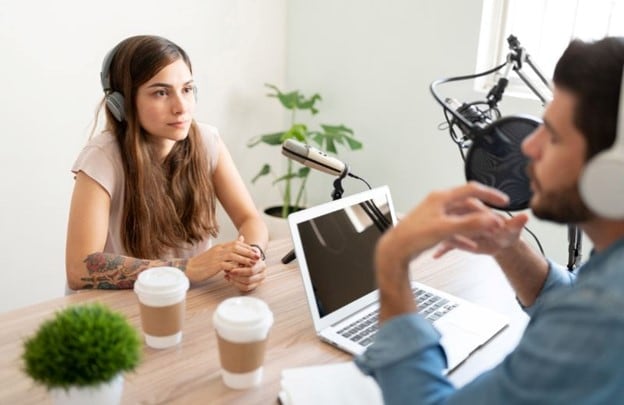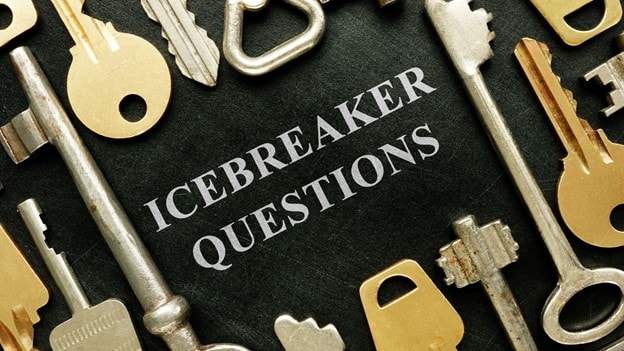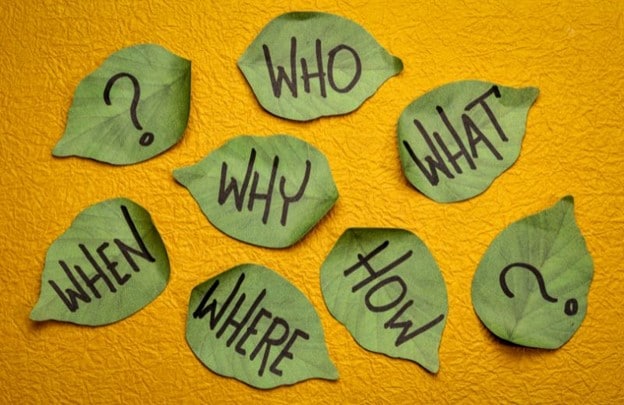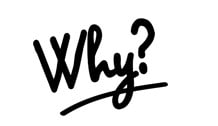The quality of the questions you ask guests makes or breaks a podcast. Interesting podcast interview questions keep the listeners involved and make your podcast engaging. If you are new to podcasting, you must be worried about the questions you are going to ask. Therefore, you should come fully prepared with your podcast questions to avoid an awkward conversation.
This guide is going to reveal how to come up with the best questions so you can nail your podcast interviews and keep your listeners hooked. So here are the best questions you can ask to make your podcast unique and captivating.
In this article
Part 1. 50 Podcast Interview Questions to Get Unique Answers
Le migliori domande sui podcast per i tuoi ospiti variano a seconda della tua posizione e del tipo di ospiti che stai intervistando. La domanda dipende se stai intervistando una celebrità, un uomo d'affari, un esperto del campo, uno scrittore, un produttore o i tuoi amici e familiari.

Modo migliore è dividere il tuo problema in diverse categorie.
Grande rompighiaccio/Domande introduttive
Problema di rottura del ghiaccio viene utilizzato per iniziare un colloquio o una riunione. Queste sono domande personali che ti permetteranno di conoscerti più velocemente. Ad esempio, il suggerimento potrebbe essere "Condividi il tuo nome, ruolo e cosa fai di solito nei fine settimana". Queste domande sono progettate per divertirsi, creare punti di connessione tra gli ospiti e costruire la fiducia nel parlare di fronte al gruppo.

Ecco alcune domande rompighiaccio che puoi porre all'inizio dell'intervista.
- Dove sei cresciuto e hai avuto un impatto su chi sei oggi?
- Cosa fai nel tuo tempo libero?
- Quando eri un bambino, cosa volevi fare e perché?
- Sei introverso o estroverso?
- Parlami di una volta in cui ti sei reso completamente imbarazzato.
- What is the most common misconception about you?
- What is the greatest compliment you have ever received?
- Who has had the largest impact on your life?
- What is one of your greatest challenges in life?
- How did you meet your spouse or partner?
Leading Question
A leading question suggests a particular answer to the question that the questioner desires. These questions mostly have a yes or no answer. However, if you extract your question from the answer just given by the guest of the podcast, it is also a leading question.

Some leading questions that you can ask are discussed below.
- Why?
- What happened next?
- H or w did u feel when this happened?
- W did u learn from that incident?
- Do u still feel sad remembering that?
- H did that experience affect the trajectory of ur life?
- T me about a time when _?
- H satisfied r u with r product?
- Which of r product features did u find most useful?
- W will u highlight ur positive experience on social media?
- D a turning point in ur career.
- W's the biggest challenge in ur profession?
- What do you mean by that?
- Can you give an example?
- What do you suggest to our audience who are facing the same problems?
Comparison Questions
In an interview, a comparison question is one where you ask a person what he prefers between these two things. This type of question can also advance the discussion of the topic. Besides, you can get a deeper understanding of what guests think and feel about this podcast episode.

You can ask questions from the comparison questions given below.
- Can you compare and contrast standard costing and actual costing?
- What do you prefer, iPhone or Android?
- Do you think social media has a positive impact or a negative impact?
- Do you buy things online or at malls mostly?
- Quale è meglio per l'e-learning e l'apprendimento in classe?
- Studenti che lavorano e studenti disoccupati: chi ha preso il momento migliore della sua vita?
- Lavoro o college, cosa sceglieresti?
- Esercizio mattutino o esercizio notturno?
- Ronaldo e Macy chi è meglio?
- Caffè e tè, quale ti piace bere?
- Andrai in palestra o fai sport?
- Che tipo di vita ti piace di più durante l'infanzia e l'età adulta?
- Sei bravo nelle attività accademiche o extracurricolari?
- Estate o inverno, che tempo pensi sia comodo?
- Wdypt et, pza or a bgr?
Gcqs
Wwmo ttq, tt's teottetso. Ciq are qthmaaote ps, tfaqateosuwputah.
- Hd ywtbr?
- Wioapocs wscwmw,awa?
- Wt3bwystml,aw?
- Wt3mwsma,w?
- Wdqwyiha,ahwyhr?
- Witmilwya?
- Wap?
- Où les spectateurs peuvent-ils en savoir plus sur vous?
- Où les auditeurs peuvent-ils s'inscrire à votre cours ou acheter vos produits?
- Comment les auditeurs peuvent-ils vous contacter en ligne?
Partie 2. Quelle est une bonne question pour une interview de podcast?
Après avoir discuté des 50 questions que vous pouvez poser lors d'un podcast, voyons ce qu'est une bonne question pour une interview de podcast. Une bonne question d'interview est confortable pour l'invité et intéressante pour les auditeurs, afin que l'invité puisse y répondre sincèrement. Par conséquent, vous devez éviter les demandes impolies et agressives lors de l'enregistrement d'un podcast. De plus, essayez de poser des questions auxquelles votre invité n'est pas souvent confronté. Cela peut révéler de nouvelles choses à son sujet et rendre votre podcast unique.
Partie 3. Conseils pour trouver et poser de meilleures questions
Poser de meilleures questions lors d'un podcast nécessite une préparation préalable. Voici quelques conseils pour vous aider à trouver de meilleures questions:
- Écrivez vos objectifs pour l'interview.
- Notez toutes les questions sur l'invité ou sur ce qu'il fait qui vous viennent immédiatement à l'esprit.
- Créez une liste de tout ce que l'invité fait (ou est intéressé par), en plus de sa principale occupation.
- Elenca le domande che vuoi porre e impara dall'oratore.
Se fai quanto segue, puoi ottenere le migliori informazioni dalla persona che stai intervistando:
Chiedi perché?

Come intervistatore, "perché" è il tuo strumento più potente. Gli ospiti di solito forniscono informazioni o consigli superficiali. Le domande successive sul "perché" li spingono oltre e danno dettagli più profondi. Aiuta anche il tuo pubblico a capire correttamente cosa vogliono dire gli ospiti.
What happened next?
Se il tuo ospite è sopraffatto dalle emozioni, fermati prima di completare la risposta chiedendo: "Cosa è successo dopo?" Per aiutarlo a raggiungere questo obiettivo. Usa un tono morbido quando fai questa domanda.
Come ti sei sentito quando e' successo?
A volte vuoi che gli ospiti rispondano alle tue domande con sentimenti ed emozioni. Immergere i tuoi ospiti nelle emozioni e rispondere alle tue domande può portare il tuo podcast al livello successivo. Tipo: "Come ti sei sentita quando e' successo?" Puoi riportare gli ospiti nel passato e lasciarlo rispondere alle tue domande con emozione.
Riflettete i vostri ospiti
Ripeti le ultime parole che l'ospite ha appena finito e, così facendo, crei un tono un po'come una domanda. E' un altro modo per far andare avanti le persone che hai intervistato. Ad esempio, il tuo problema potrebbe essere questo. Forse stai chiedendo a qualcuno del software preferito dell'anno che usa per il montaggio video.
Potrebbe rispondere a questa domanda: "Uno dei miei software preferiti si chiamaWondershare Filmora. It's a using-friendly video editing software that you can use even to do podcast shows and impressive vlogs. And I love it because I have been editing YouTube videos daily."
- You: "You've been going to edit every day?"
- The Guest: "Yeah, I've been editing videos for YouTube for over 200 days. And it's been really neat to connect with audiences there."
- You: "Connect with the audience? How?"
- The Guest: "Well, you know it's posting videos, so there's intimate interaction with people who seem to be there and watch the videos I post. And I've gotten to know many of them by name now."
So you see how this can continue to move forward by simply mirroring your guest. Try it in your following conversation, even if it's not an interview.
Tell me about a time when…
The best thing you can extract from someone in a podcast is their story. If you want to pull out a story from someone, phrase it like this, "Tell me about a time when..." After this question, your job is to sit back, listen, and not interrupt the guest.
Part 4. Podcast Questions to Avoid Asking
Evitare di porre domande sbagliate è importante quanto salutare le domande. Alcuni problemi possono avere un impatto negativo sulla qualità del tuo podcast, quindi evita di porre tali domande. Ecco alcune domande che non dovresti porre.
- Evita di porre domande che vengono spesso poste agli ospiti. Ad esempio, se appare in molti podcast e programmi di interviste, spesso gli viene posta la stessa domanda.
- Evita di porre domande di base come "Per cosa sei più famoso?"
- La domanda che ti aspetti di ottenere un "sì" dovrebbe essere evitata, perché un semplice "sì" non aggiunge alcun valore al colloquio per coloro che ascoltano.
- Ancora una volta, evita di porre domande che puoi prevedere che la risposta sarà "no".
- Evita problemi che potrebbero offendere gli ospiti.
Quinta parte. Dovrei inviare un podcast di domande pre-intervista?
Sì, puoi inviare domande di intervista agli ospiti. Pertanto, hanno il tempo di preparare risposte interessanti. Inoltre, possono pensare alle proprie risposte o dare risposte lunghe. In entrambi i casi, si sentiranno più a loro agio e ti aiuteranno a creare contenuti migliori.
Porta i tuoi contenuti al livello successivo e condividili
La qualità di un podcast dipende dalle domande poste. Selezionando attentamente le domande da porre e le domande da evitare, puoi portare i tuoi contenuti al livello successivo. Ha anche aumentato l'interesse del pubblico.
Consider the following when picking which of the above questions to use on your show: will it let your guest reveal something about who they are, how they think, or what they know will benefit your audience? If so, you are most likely on the right path! Make your podcast worth listening to get more views and shares.
 Garanzia di Download Sicuro, zero malware
Garanzia di Download Sicuro, zero malware


